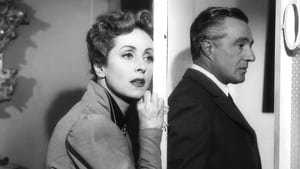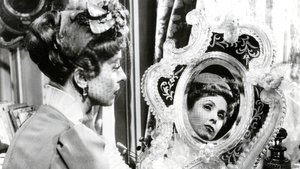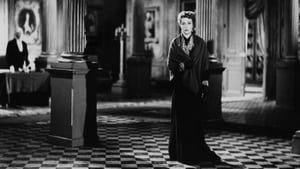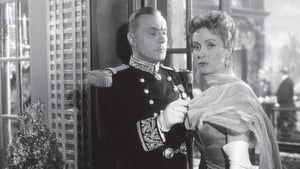Contact: info@alwanfilm.com
Video Sources 0 Views
- Watch trailer
- The Earrings of Madame de

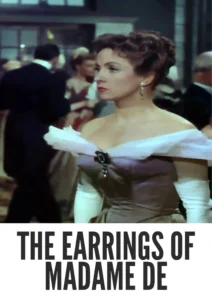
Synopsis
Table of Contents
ToggleThe Earrings of Madame de 1953 Colorized: A Timeless Romance Review

Introduction
“The Earrings of Madame de,” released in 1953, is a cinematic masterpiece that transcends time and genre. Renowned for its captivating storyline, stellar performances, and exquisite cinematography, this film has captivated audiences for decades. In this review, we delve into the enchanting world of “The Earrings of Madame de,” exploring its significance as an early colored film and its enduring legacy in the realm of cinema.
Check The Full Colorized Movies List
Check Our Colorized Movies Trailer Channel
Understanding The Earrings of Madame de 1953 Colorized: Director, Cast, and Genre
Directed by Max Ophüls, “The Earrings of Madame de” showcases the director’s unparalleled talent for storytelling and visual aesthetics. The film features an ensemble cast, including Danielle Darrieux as the titular character, Charles Boyer as General André, and Vittorio De Sica as Baron Donati. Set against the backdrop of 19th-century Parisian high society, “The Earrings of Madame de” is a timeless tale of love, betrayal, and redemption, firmly establishing itself within the romantic drama genre.
Exploring the World of The Earrings of Madame de 1953 Colorized: Plot and Characters
The plot revolves around Madame de’s affair with the dashing Italian diplomat Baron Donati, which leads to a series of unexpected events triggered by a pair of earrings. As the narrative unfolds, viewers are drawn into a web of deceit, passion, and tragedy, as Madame de navigates the complexities of her heart amidst societal expectations and personal desires. The characters are intricately developed, each grappling with their own moral dilemmas and inner conflicts, adding depth and richness to the story.
The Art of Film Colorization
Film colorization, an innovative technique that adds color to black and white films, has been a subject of much debate in the film industry. While some argue that it breathes new life into classic movies, others believe it detracts from the original artistic vision. In the case of “The Earrings of Madame de,” the decision to release an early colored version opens up new possibilities for viewers to experience the film in a different light, highlighting its visual splendor and timeless appeal.
Early Colored Films: A Brief History
The emergence of early colored techniques in cinema marked a significant milestone in film history, offering filmmakers new tools to enhance storytelling and engage audiences. From hand-tinted frames to advanced colorization processes, the evolution of color in film has shaped the way we perceive and appreciate cinematic artistry, paving the way for future innovations in the industry.
The Earrings of Madame de 1953 and Its Early Colored Version
The decision to release “The Earrings of Madame de” in a colorized format speaks to the film’s enduring popularity and timeless appeal. By offering viewers the option to experience the movie in color, filmmakers aim to attract new audiences while paying homage to the original black and white version. However, the colorization process must be approached with care and respect for the director’s artistic vision, ensuring that it enhances rather than detracts from the film’s aesthetic integrity.
The Debate Over Film Colorization
The debate surrounding film colorization continues to spark controversy within the film community. While some argue that it modernizes classic movies and makes them more accessible to contemporary audiences, others contend that it undermines the artistic intent of the original filmmakers. As technology advances and new methods of colorization emerge, the debate rages on, with no easy answers in sight.
Examining The Earrings of Madame de 1953 as an Early Colored Film
Viewing “The Earrings of Madame de” in its early colored version offers a fresh perspective on the film’s visual storytelling and aesthetic appeal. Colorization has the potential to enhance the viewer’s immersion in the narrative, bringing to life the vibrant world of 19th-century Paris with its opulent costumes, lush interiors, and picturesque landscapes. However, it is essential to approach the colorization process with caution, ensuring that it remains faithful to the director’s original vision and preserves the film’s timeless charm.
Influence and Legacy: The Earrings of Madame de 1953 Colorized’s Impact on Cinema
“The Earrings of Madame de” has left an indelible mark on the cinematic landscape, influencing filmmakers and audiences alike with its timeless story and visual splendor. Its exploration of love, desire, and fate continues to resonate with viewers, transcending cultural and generational boundaries. The film’s enduring legacy serves as a testament to the power of storytelling and the enduring appeal of classic cinema.
Director’s Cinematic Legacy: Beyond The Earrings of Madame de 1953 Colorized
Max Ophüls’s contribution to cinema extends far beyond “The Earrings of Madame de.” Known for his elegant visual style and nuanced storytelling, Ophüls has left an indelible mark on the world of filmmaking, inspiring generations of filmmakers with his innovative approach to the medium. His legacy lives on in the timeless beauty of his films, which continue to captivate audiences around the world.
Themes Explored in The Earrings of Madame de 1953 Colorized
“The Earrings of Madame de” delves into a myriad of themes, including love, betrayal, and the consequences of desire. Through the lens of its complex characters and intricate plot, the film explores the intricacies of human relationships and the fragile nature of happiness. It delves into the complexities of social conventions and personal identity, offering viewers a thought-provoking exploration of the human condition.
Reception and Controversy Surrounding The Earrings of Madame de 1953 Colorized
Upon its release, “The Earrings of Madame de” received widespread critical acclaim for its captivating storyline, stellar performances, and exquisite cinematography. Audiences were drawn to its timeless charm and emotional depth, cementing its status as a cinematic masterpiece. However, the decision to release an early colored version sparked controversy among purists, who argued that it detracted from the film’s original artistic vision.
Where to Watch The Earrings of Madame de 1953 Colorized Online
For those eager to experience the timeless beauty of “The Earrings of Madame de,” the film is readily available on popular streaming platforms. Viewers can immerse themselves in the enchanting world of 19th-century Paris and witness the timeless allure of love, desire, and fate unfold on screen.
FAQs About The Earrings of Madame de 1953 Colorized
1. Is “The Earrings of Madame de” based on a true story?
No, “The Earrings of Madame de” is not based on a specific true story. However, the film draws inspiration from the works of French author Louise de Vilmorin, whose literary contributions often explored themes of love, desire, and fate.
2. Who composed the film’s score?
The hauntingly beautiful score of “The Earrings of Madame de” was composed by renowned musician Oscar Straus. His evocative melodies complement the film’s romantic storyline and add depth to its emotional resonance.
3. What is the significance of the earrings in the film?
The earrings serve as a symbolic motif throughout the film, representing Madame de’s desires, regrets, and ultimately, her fate. As the narrative unfolds, the earrings take on a deeper significance, reflecting the character’s inner turmoil and the consequences of her actions.
4. How does the colorization affect the viewing experience of the film?
The decision to release “The Earrings of Madame de” in a colorized format offers viewers a new perspective on the film’s visual storytelling and aesthetic appeal. While some may appreciate the enhanced vibrancy and realism that colorization brings, others may prefer the timeless elegance of the original black and white version. Ultimately, the choice between colorized and black and white formats depends on individual preferences and appreciation for the director’s artistic vision.
5. What themes are explored in “The Earrings of Madame de”?
“The Earrings of Madame de” delves into a myriad of themes, including love, betrayal, and the consequences of desire. Through the lens of its complex characters and intricate plot, the film explores the intricacies of human relationships and the fragile nature of happiness. It delves into the complexities of social conventions and personal identity, offering viewers a thought-provoking exploration of the human condition.
6. How was the film received upon its release?
Upon its release, “The Earrings of Madame de” received widespread critical acclaim for its captivating storyline, stellar performances, and exquisite cinematography. Audiences were drawn to its timeless charm and emotional depth, cementing its status as a cinematic masterpiece. However, the decision to release an early colored version sparked controversy among purists, who argued that it detracted from the film’s original artistic vision.
7. Where can I watch “The Earrings of Madame de” online?
For those eager to experience the timeless beauty of “The Earrings of Madame de,” the film is readily available on popular streaming platforms. Viewers can immerse themselves in the enchanting world of 19th-century Paris and witness the timeless allure of love, desire, and fate unfold on screen.
Conclusion
“The Earrings of Madame de” stands as a testament to the enduring power of cinema to captivate, inspire, and provoke thought. Whether experienced in its original black and white format or in a newly colorized version, the film continues to enchant audiences with its timeless beauty and emotional depth. As we celebrate its legacy, let us appreciate the artistry of Max Ophüls and the timeless allure of classic cinema.
